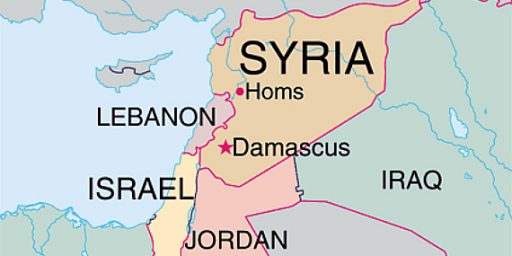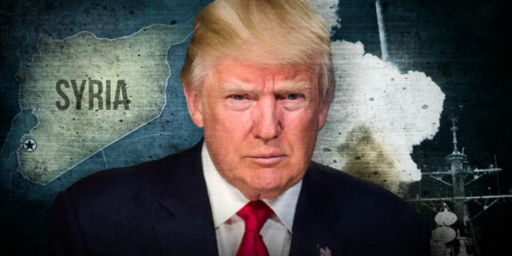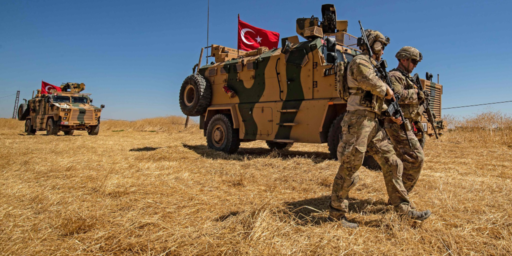Framework for Elimination of Syrian Chemical Weapons
The State Department has posted a brief outline of the agreement being hammered out among the United States, Russia, and Syria. Here’s the meat of it:
The United States and the Russian Federation commit to work together towards prompt adoption of a UN Security Council resolution that reinforces the decision of the OPCW Executive Council. This resolution will also contain steps to ensure its verification and effective implementation and will request that the UN Secretary-General, in consultation with the OPCW, submit recommendations to the UN Security Council on an expedited basis regarding the UN’s role in eliminating the Syrian chemical weapons program.
The United States and the Russian Federation concur that this UN Security Council resolution should provide for review on a regular basis the implementation in Syria of the decision of the Executive Council of the OPCW, and in the event of non-compliance, including unauthorized transfer, or any use of chemical weapons by anyone in Syria, the UN Security Council should impose measures under Chapter VII of the UN Charter.
The proposed joint US-Russian OPCW draft decision supports the application of Article VIII of the Chemical Weapons Convention, which provides for the referral of any cases of non-compliance to the United Nations General Assembly and the United Nations Security Council.
In furtherance of the objective to eliminate the Syrian chemical weapons program, the United States and the Russian Federation have reached a shared assessment of the amount and type of chemical weapons involved, and are committed to the immediate international control over chemical weapons and their components in Syria. The United States and the Russian Federation expect Syria to submit, within a week, a comprehensive listing, including names, types, and quantities of its chemical weapons agents, types of munitions, and location and form of storage, production, and research and development facilities.
We further determined that the most effective control of these weapons may be achieved by removal of the largest amounts of weapons feasible, under OPCW supervision, and their destruction outside of Syria, if possible. We set ambitious goals for the removal and destruction of all categories of CW related materials and equipment with the objective of completing such removal and destruction in the first half of 2014. In addition to chemical weapons, stocks of chemical weapons agents, their precursors, specialized CW equipment, and CW munitions themselves, the elimination process must include the facilities for the development and production of these weapons. The views of both sides in this regard are set forth in Annex B.
The United States and the Russian Federation have further decided that to achieve accountability for their chemical weapons, the Syrians must provide the OPCW, the UN, and other supporting personnel with the immediate and unfettered right to inspect any and all sites in Syria. The extraordinary procedures to be proposed by the United States and the Russian Federation for adoption by the OPCW Executive Council and reinforced by a UN Security Council resolution, as described above, should include a mechanism to ensure this right.
Russia is probably the country best-equipped for disposing of Syria’s chemical weapons. Whether the Russian Federation will prove a mutually acceptable destination for them is another question entirely.
I think that this is a good step in removing the Assad regime’s chemical weapons since it addresses not only the regime’s use of chemical weapons but its chemical weapons program. It does, however, tacitly absolve Assad from responsibility for past chemical weapons use, something that I suspect will be objectionable to many.






Now if we can get the rebels to give up their chemical weapons, we’ll have some real progress.
I thought Russia did not have the resources to destroy its own chemical weapons and was dependent on America doing it for them. Somebody posted a recent law review on the subject of why the US and Russia are not in compliance with the Chemical Weapons Convention at the Glittering Eye. Hopefully, that commentor will appear in this thread to clarify this point. and not pretend like he wasn’t the one who posted it.
@PD Shaw: OK, OK. It sounds like Russia had significant financial problems with safely destroying its chemical weapons after the Cold War, but with significant contributions from the U.S. and other Western nations of money, technology and personnel, Russia is scheduled to come into compliance with its international chemical weapons obligations by 2015 (quicker than the U.S.) There appears to be a joint US-Russian facility in Shchuch’ye that might provide a compromise destination.
Here’s a little backgrounder on the Shchuch’ye chemical weapons destruction facility.
There are several reasons I suggested Russia as a logical place for destroying Syria’s chemical weapons. The Shchuch’ye facility is significantly closer to Syria. It’s quite remote. It’s still operational and has the infrastructure, including the security infrastructure, to do the job. The most recently active U. S.-based destruction facilities are an order of magnitude farther away. I don’t particularly relish the transportation of an unknown volume of chemical weapons in who knows what condition through the U. S.
The Pochep and Leonidovka facilities aren’t nearly as remote. The Maradykovsky facility would be another candidate.